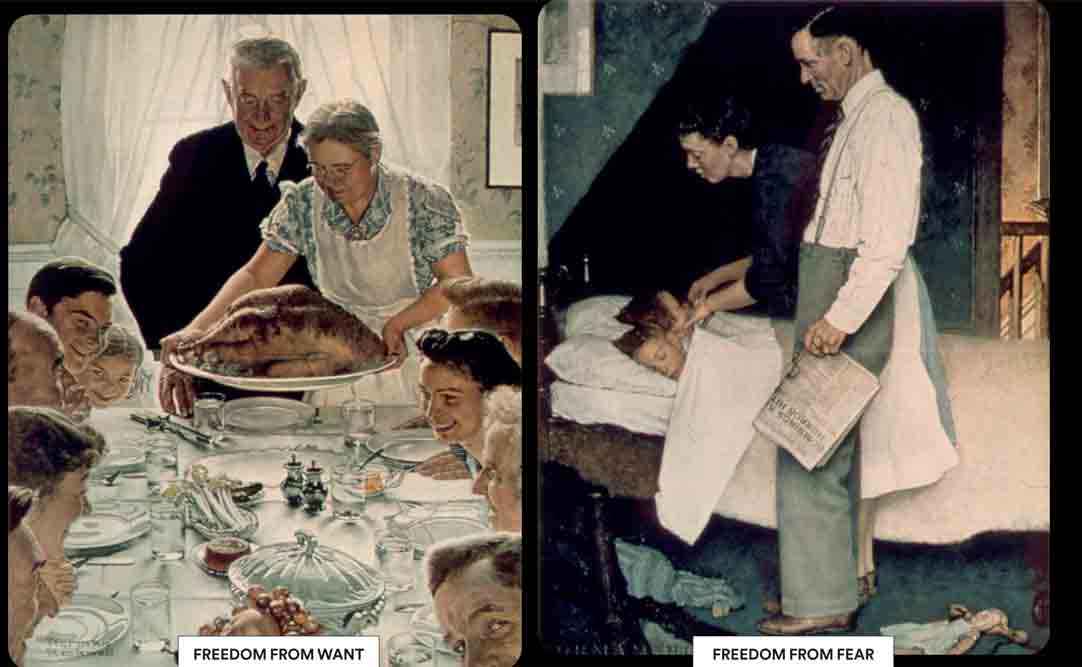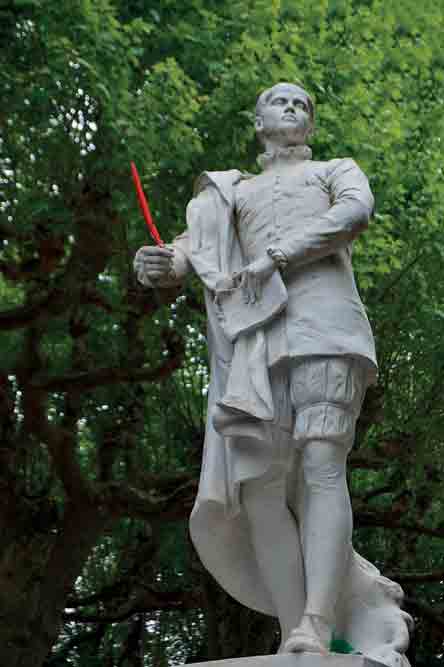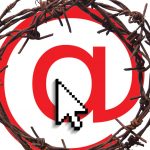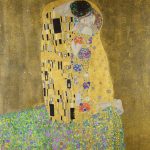Defying Definitions
The intimate and public expression of freedom
 Carlo Pizzati
Carlo Pizzati
 Carlo Pizzati
Carlo Pizzati
 |
09 Aug, 2024
|
09 Aug, 2024
/wp-content/uploads/2024/08/DefyingDefinition1.jpg)
(Norman Rockwell’s 1943 Series The Four Freedoms)
MY NAME, CARLO, IS DERIVED FROM the Old Norse word karlon, meaning ‘free man’. Of course, it all depends on what you do with that freedom.
Through the centuries the name karlon came to mean just ‘man’, ‘fellow’, or, in today’s parlance: ‘dude’ or ‘bro’. This led to the Old English declination into ceorl, a man of low degree, free but common, eventually giving birth to the derogatory ‘churl’.
The development of this etymology is a reminder that with your freedom you could become a brave Charlemagne, a studious Carl Linnaeus, a brilliant Carl Jung, an influential Karl Marx, even a stylish Karl Lagerfeld, if not a King Charles… or you could turn into a simple ‘churl’, a grouch, a grump, a rude person. That is what happens with freedom. It is how you use it.
Karlon also meant free from enslavement from the waning Eastern Roman Empire which was converting many Viking raiders to Christianity. Nomen omen said the Roman thinkers: the name contains the destiny.
At 16, my own destiny brought me to move from the Land of the former Roman Empire to the Land of the Free and the Brave, America, and, later, to relocate to the Land of Spiritual Freedom, India.
And yet, although I have been chasing it all my life, I still sense that freedom has eluded me, as perhaps, ultimately, it escapes us all, because freedom is a word of many misunderstandings, an expression occasionally hiding the opposite of what it promises.
One problem with freedom is the illusion that we need to have it in order to pursue and achieve happiness. Many believe happiness is directly connected to satisfying our goals, which are built around desires. We want to be free to feed our cravings, whatever they may be. For centuries, mighty clashes and deep philosophical misunderstandings have crystalised around this concept.
As I have learned in India, to be free means to eliminate the cravings, or at least to tame their capacity to control our lives. Virtue today may sound like a stuffy word, evoking high Victorian collars and Prussian teachers hitting children with squared wooden sticks. Desire sounds much more appealing. Yet, are not cravings, ultimately, what make the pursuit of a goal more painful and tormented?
The question of freedom would be quickly solved if we were able to live by these obvious conclusions. But it is hard for most of us. Many still believe our resolve needs to be free in order to seek what we want. However, this construct collapses upon rigorous examination.
It is carrot-and-stick. For ages, free will has been the carrot dangling in front of our mouths, while feelings of guilt have been the hard club hitting our back to redirect our actions.
Yet is free will actually possible? We cannot express a desire which comes from a neutral, independent source inside our mind. Again, etymology comes to our aid in dissecting a truer meaning hidden behind the word.
The Oxford dictionary tells us that the adjective ‘free’ means “to be able to act or be done as one wishes; not under the control of another.” It presumes, fallaciously, that we are in control of our tastes, desires and cravings. And many presume that doing “as one wishes” is what defines us.
The historical meaning of the adjective ‘free’ is identified by its opposite: “not enslaved”, evoking the feeling and idea of liberation from being confined, imprisoned and controlled. Yet, even when we think we are acting freely, there is something controlling us from within an inner blind spot.

We are not truly able express a desire which comes from a neutral or independent source inside our mind, or soul, if you prefer. When we choose freely the colour red over yellow, for example, who is doing the choosing? Who is this independent ‘I’ opting for red over yellow, and what is the deeper motivation of this choice? Is it because, perhaps, when this ‘I’ was being nursed from their mother’s breast, it associated the pleasure of nourishment with the colour of the red blouse, sari or sweater the mother was wearing? So, is this ‘free’ choice of red truly independent from the controlling element of experience? It is not.
Scientific thought tells us we are the sum of our parents’ chromosomes and how this mix reacted to the life events it has been exposed to. This is how character consolidates from a mould we are given at birth.
So, there is no truly autonomous ‘I’ expressing that free will which, as we have seen, is never really free from outside causes. It has formed through exposure to experiences, external factors which make the chimera of pure freedom a phantom we keep chasing. This is why it is so difficult to logically demonstrate that free will exists.
What ‘I’ desire is not really controlled by me; it has grown with me. If I chose to become a writer it was not because of my free will, but because of how rainy it was in the valley of my first years, how many books I found comfort in, how my daring chromosomes fooled me into believing one day I would also be able to write pages that awake the reader’s mind, feelings and imagination.
So can I say that it was my free will? It was not. It was contingent on my experiences as there is no ‘I’ truly free of outside causes that can independently decide what it desires and aims for.
The fallacy of the idea of freedom lies exactly there. I am free to submit to a will which I have no control or say over. There is nothing truly free about what is guiding our actions. All the opposite. We are slaves to the misnomer ‘free will’, a phenomenon which should be defined as “constructed will, which keeps me from the freedom of not having a will.”
In considering this, British philosopher John Gray’s insights in his The Soul of the Marionette (2016) reveal another layer to our understanding of freedom. Gray suggests that the freedom we so eagerly chase is, in essence, a myth. He argues that we are like marionettes, our strings pulled by unseen forces rather than freely choosing our paths.
To support this theory, we can look at how neuroscientist Benjamin Libet documented the existence of a nervous electrical impulse prompting our actions, preceding the cerebral activity we associate with rational decision-making.
This view aligns with what Sam Harris argues in Free Will (2012): “Free will is an illusion. Our wills are simply not of our own making. Thoughts and intentions emerge from background causes of which we are unaware and over which we exert no conscious control. We do not have the freedom we think we have.” Harris’ words echo Gray’s assertion that the sense of autonomy we hold is a comforting fiction, a mirage in the desert of our true nature.
NOW THE FREEDOM EMBEDDED IN THE meaning of my name, ‘free man’, seems to take on a different light. The historical transformation of the term from a symbol of liberation to something more ordinary reflects the complex relationship between freedom and the constraints we live under.
This alignment with Gray’s idea of us as marionettes and Harris’ notion of illusory free will suggests that the freedom we seek is not so much about breaking away from all constraints, but about recognising and understanding those constraints. In this sense, the ideal of pure freedom becomes a distant dream, while the reality of our conditioned will is much closer.
Yet there is hope. True freedom may lie not in the absence of constraints but in the awareness of them. Ultimately, it is a reinterpretation of what Jesus said to the Jews in the Bible: “the truth will set you free”.
There is no truly autonomous ‘I’ expressing that free will which is never really free from outside causes. It has formed through exposure to experiences, external factors that make pure freedom a phantom we keep chasing. This is why it is so difficult to logically show that free will exists
Recognising these influences can provide a different kind of liberation— one where we are more conscious of the forces shaping us and can navigate them with greater insight.
The moment I am aware of why I chose to become a writer, and I surrender the unfounded concept of an ‘I’ free of outside influences arriving magically and ‘freely’ at this choice, I may be able to understand why I am driven by what motivates me. Why I have enslaved myself ‘voluntarily’ to the torments of writing, considering of course that ‘voluntary’ comes from the Latin voluntas, or ‘will’. And by now we know that is a rather frail concept.
In Escape from Freedom (1941) Erich Fromm explained that there is also a difference between “freedom from”, which follows the original etymological interpretation of ‘free’ meaning “devoid of barriers”, and “freedom to”. If you are living in a household, dependent on your parents, you might crave “freedom from” their control. But once you gain it you need to engage in “freedom to” do whatever you might have in mind. You are now free to enact a plan, proactively.
As you can see, our relationship with the idea of freedom has intimate implications as well as public ones. The intuitions of Étienne de La Boétie in Discourse on Voluntary Servitude (1577) provide a compelling perspective on why personal but also collective freedom often seems elusive. La Boétie, a French thinker of the 16th century and an intimate friend of Montaigne, explores a profound paradox: Why do we willingly surrender our freedom? Why do so many people submit to tyrants, despite having the power to resist? His work gains a contemporary relevance considering the ways in which power, from the onset of the contemporary idea of democracy, has increasingly been masquerading as benevolence.

La Boétie identifies three types of tyrants, including those who come to power through popular election. For him, the difference between elected leaders and hereditary despots is minimal; both types of rulers may treat their subjects as property to be controlled.
Regardless of how power is obtained, the essence of tyranny remains the same. Elected officials, like despots, can view the power they are given as their own to wield, imposing their will on the people.
THE FRENCH THINKER ENQUIRES WHY people come to accept their own servitude and posits that servitude is not merely enforced through violence, but is also subtly maintained through custom, ignorance, social atomisation, and diversion. These elements work to obscure the reality of oppression and to normalise submission.
Just as John Stuart Mill, in his essay On Liberty (1859), noted the “tyranny of custom” as a barrier to human development, La Boétie saw how habitual submission can become so ingrained that people no longer perceive it as oppressive. We can choose to lose our freedom. And we often do exactly that, in many varied contexts.
La Boétie’s critical insight is that genuine freedom, if such a thing can indeed exist, is not merely about changing rulers or political systems, but about recognising and resisting the underlying mechanisms that perpetuate servitude. His assertion, “Resolve not to serve and you are free”, suggests that true freedom begins with an inner resolve to reject submission.
It is not just a matter of changing external conditions but involving a deeper shift in our understanding and relationship with power. Which can also be seen as one of the early roots of the ideas behind the French Revolution which, in turn, mixed with other influences, gave rise to our modern concept of democracy and freedom.
If our wills are shaped by external forces and our choices are not as autonomous as we believe, then our acceptance of servitude can be seen as a form of self-imposed limitation. La Boétie’s notion of voluntary servitude illustrates how our perceived lack of freedom can stem from internalised acceptance of these constraints.
The path to genuine freedom, then, may not lie in eliminating all constraints but in understanding and confronting the mechanisms that keep us bound. Recognising the subtle forms of control that shape our choices can lead to rejecting all types of subjugations and embracing a deeper, more conscious autonomy. And can perhaps turn a karlon into a Carlos Alcaraz, keeping him from becoming a complete churl.

/wp-content/uploads/2024/12/Cover_Double-Issue-Spl.jpg)












More Columns
The Heart Has No Shape the Hands Can’t Take Sharanya Manivannan
Beware the Digital Arrest Madhavankutty Pillai
The Music of Our Lives Kaveree Bamzai